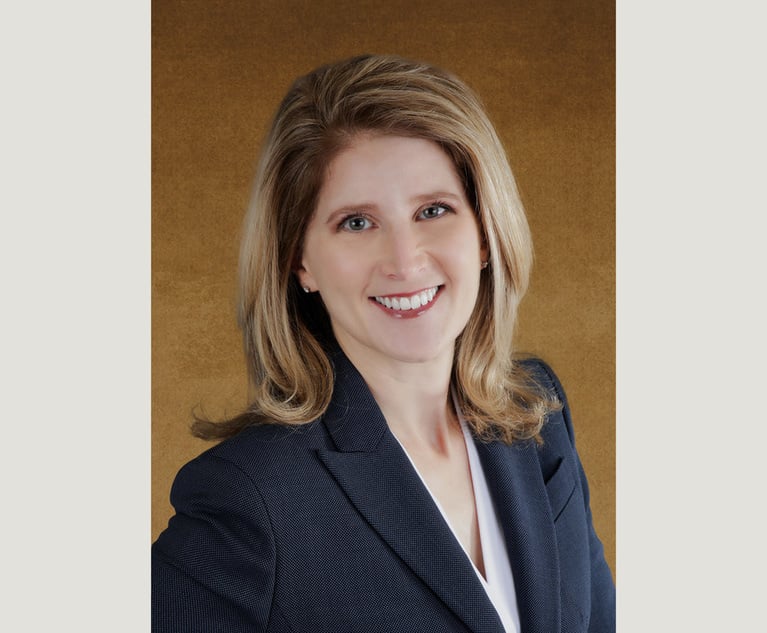Investments and Retirement Planning Post- and Pre-Divorce
Parties going through a divorce often have many decisions they need to make. Often those decisions will affect their financial future. Many financially dependent spouses are not prepared to understand their future financial needs.
February 12, 2018 at 02:37 PM
6 minute read

Parties going through a divorce often have many decisions they need to make. Often those decisions will affect their financial future. Many financially dependent spouses are not prepared to understand their future financial needs. As a family law attorney we utilize many resources such as financial investors, forensic accountants and tax experts to help the financially dependent spouse navigate the divorce process.
While a financially dependent spouse is going through a divorce we will ask them what their goals will be over the next five to ten years. Such goals may include employment, retirement, college expenses, retaining or selling the marital house and alimony. All of these goals are discussed with the client before resolving their case so that the client understands the expectations and documents necessary for them to obtain their goals. Identifying income sources often involves several steps.
A financially dependent spouse may need to think about retaining the house post-divorce. They may need to think about whether they will have to pay for college. They may also need to rely on what they will receive in the divorce by way of investments or retirement. Without first meeting with their attorney to discuss their goals and then meeting with a financial adviser who can identify additional sources of income, including Social Security, it is almost impossible to come to a complete resolution of all issues.
One of the first directives we may give a client is to require them to calculate their monthly expenses. Often a spouse is unaware of how much they need each month and by forcing them to put on paper exactly what they are spending gives the client a clear picture of what they might need going forward. Once, we have the monthly expenses we need to know whether they have sufficient income to support themselves in the future. Items we will consider are employment income, investment income and whether they will be entitled to alimony post-divorce.
In considering employment income, the dependent spouse may have little to no employment history because they relied on their spouse for support. If the dependent spouse is not employed we may use a vocational expert to identify their skill set. Often a vocational expert can identify an area of work the spouse may not have considered. We may then have the client rework their resume, receive some training or education and develop their professional profile online. We may also send them to a recruiter to help them begin building their network.
The next step may be to consider their investment income. It is important for a financially dependent spouse not to invest based on emotion. David A. Simon, an investment officer with a national bank stated in a recent presentation that you shouldn't buy a stock based on what someone may have mentioned casually in a conversation or as an impulsive response to a positive market. It is particularly important to speak to a financial adviser during a divorce when the client may be emotionally strained or vulnerable. Investors should meet with professionals to discuss their future goals and understand the risks they are taking. In determining the investment goals of the dependent spouse age, needs, and goals are all important considerations. Additional information such as whether a dependent spouse will receive cash, retirement or property in their settlement will help the financial advisor understand what will be available for investment post-divorce.
Alimony may also be an additional source of income for the financially dependent spouse. In calculating alimony it is important to understand the financially independent spouse's income. This is not always an easy task. Our firm may utilize the skills of a forensic expert to evaluate an executive level professional, business owner or spouse who has income from many sources. Calculating income in complex support cases may involve reviewing employment contracts, perquisites, bank statements and tax returns. A forensic accountant will review documents efficiently and identify net income available for support.
Pursuant to the Tax Cuts and Jobs Act which was just signed into law by President Donald Trump, alimony will no longer be deductible beginning with any divorce agreements executed after Dec. 31, 2018. Likewise, the spouse receiving alimony will no longer need to include alimony as part of their income. With this new tax law, there may be an increase in divorce resolutions before the end of 2018 so that the payor spouse will be able to benefit from the deduction. It is unclear if beginning in 2019 parties will negotiate additional monies in the divorce settlement as an offset for alimony which would have been paid as alimony under the prior law. Another reason a financial advisor will benefit the dependent spouse in negotiating the terms of their divorce settlement.
Retirement selections are also a significant part of the divorce negotiation. Depending on the age of the recipient, retirement income may be many years in the future or within a few years of being divorced. This extra stream of income can be a valuable resource for a financially dependent spouse. Tax implications should be discussed with the dependent spouse and be part of the overall calculations in determining whether the spouse's monthly expenses will be covered by the retirement income or additional income streams will be necessary.
Obtaining a divorce and negotiating a financial settlement is a multistep process which begins months in advance of the final divorce agreement or court order. It is extremely important to utilize the services of experts in the divorce process including forensic accountants, tax preparers, and financial advisers. Identification of goals and needs of the client as well as discussions on how to obtain the desired result must be considered before finalizing a divorce.
Carolyn R. Mirabile, a partner at Weber Gallagher and head of the firm's family law group, counsels clients in family law matters including divorce, support, custody, property distribution and drafting of marital settlement and prenuptial agreements. She can be reached at [email protected].
This content has been archived. It is available through our partners, LexisNexis® and Bloomberg Law.
To view this content, please continue to their sites.
Not a Lexis Subscriber?
Subscribe Now
Not a Bloomberg Law Subscriber?
Subscribe Now
NOT FOR REPRINT
© 2025 ALM Global, LLC, All Rights Reserved. Request academic re-use from www.copyright.com. All other uses, submit a request to [email protected]. For more information visit Asset & Logo Licensing.
You Might Like
View All
Pa. Supreme Court to Decide Enforceability of 'Browsewrap' Arbitration Agreements
8 minute read
From a Mediator’s Perspective: Common Mis-steps That Parties Make at Mediation
6 minute readTrending Stories
Who Got The Work
J. Brugh Lower of Gibbons has entered an appearance for industrial equipment supplier Devco Corporation in a pending trademark infringement lawsuit. The suit, accusing the defendant of selling knock-off Graco products, was filed Dec. 18 in New Jersey District Court by Rivkin Radler on behalf of Graco Inc. and Graco Minnesota. The case, assigned to U.S. District Judge Zahid N. Quraishi, is 3:24-cv-11294, Graco Inc. et al v. Devco Corporation.
Who Got The Work
Rebecca Maller-Stein and Kent A. Yalowitz of Arnold & Porter Kaye Scholer have entered their appearances for Hanaco Venture Capital and its executives, Lior Prosor and David Frankel, in a pending securities lawsuit. The action, filed on Dec. 24 in New York Southern District Court by Zell, Aron & Co. on behalf of Goldeneye Advisors, accuses the defendants of negligently and fraudulently managing the plaintiff's $1 million investment. The case, assigned to U.S. District Judge Vernon S. Broderick, is 1:24-cv-09918, Goldeneye Advisors, LLC v. Hanaco Venture Capital, Ltd. et al.
Who Got The Work
Attorneys from A&O Shearman has stepped in as defense counsel for Toronto-Dominion Bank and other defendants in a pending securities class action. The suit, filed Dec. 11 in New York Southern District Court by Bleichmar Fonti & Auld, accuses the defendants of concealing the bank's 'pervasive' deficiencies in regards to its compliance with the Bank Secrecy Act and the quality of its anti-money laundering controls. The case, assigned to U.S. District Judge Arun Subramanian, is 1:24-cv-09445, Gonzalez v. The Toronto-Dominion Bank et al.
Who Got The Work
Crown Castle International, a Pennsylvania company providing shared communications infrastructure, has turned to Luke D. Wolf of Gordon Rees Scully Mansukhani to fend off a pending breach-of-contract lawsuit. The court action, filed Nov. 25 in Michigan Eastern District Court by Hooper Hathaway PC on behalf of The Town Residences LLC, accuses Crown Castle of failing to transfer approximately $30,000 in utility payments from T-Mobile in breach of a roof-top lease and assignment agreement. The case, assigned to U.S. District Judge Susan K. Declercq, is 2:24-cv-13131, The Town Residences LLC v. T-Mobile US, Inc. et al.
Who Got The Work
Wilfred P. Coronato and Daniel M. Schwartz of McCarter & English have stepped in as defense counsel to Electrolux Home Products Inc. in a pending product liability lawsuit. The court action, filed Nov. 26 in New York Eastern District Court by Poulos Lopiccolo PC and Nagel Rice LLP on behalf of David Stern, alleges that the defendant's refrigerators’ drawers and shelving repeatedly break and fall apart within months after purchase. The case, assigned to U.S. District Judge Joan M. Azrack, is 2:24-cv-08204, Stern v. Electrolux Home Products, Inc.
Featured Firms
Law Offices of Gary Martin Hays & Associates, P.C.
(470) 294-1674
Law Offices of Mark E. Salomone
(857) 444-6468
Smith & Hassler
(713) 739-1250







